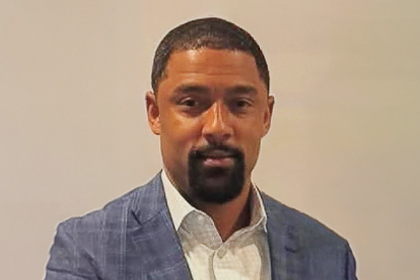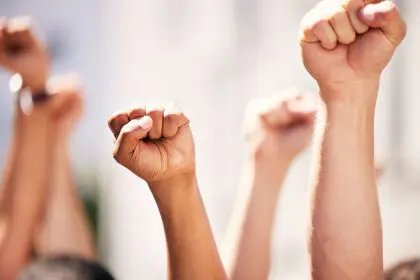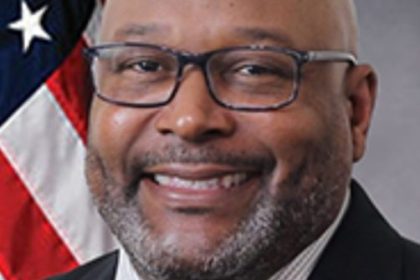
In a post-election interview with rolling out, Azad Ahmadi, combat veteran and board chairman of the Georgia Black Republican Council, discusses the implications of the Democratic Party’s defeat in 2024 and impact of Donald Trump’s presidential victory on the Black community. Ahmadi emphasizes that politics shouldn’t affect how people treat one another and calls for unity regardless of political affiliations, pointing to potential economic benefits of Republican policies.
Ahmadi is a Black Republican, and has faced brutal criticism for his Republican Party membership. He notes, however, a positive shift in how his political views were received in the Black community, particularly among Black men, during this 2024 election cycle. He attributed the Democratic Party’s loss partly to their reliance on celebrity endorsements, which he said didn’t resonate with voters, and their underestimation of social media’s impact in spreading awareness of problems in Democrat-led cities. Ahmadi also suggests that Trump’s legal challenges helped him connect with Black male voters who have experienced similar treatment in the justice system.
Monisha Brown: Hi, rolling out family. Today, I am honored to speak with and to introduce you all to Azad Ahmadi, who is a former U.S. Army officer, a combat veteran, small business owner, and the board chairman of the Georgia Black Republican Council, which is a GOP affiliate. Azad, welcome to rolling out.
Azad Ahmadi: Thanks for having me.
Monisha Brown: Absolutely. The reason I have you here is because, obviously, the post-election results didn’t turn out how the Democratic Party expected. But, here we are. January the 1st, 2025 is days away. We must figure this thing out and coexist. I brought you here because, as a Black Republican man, you have a unique perspective. What is your first message to those of us in the community who are upset about the election results?
Azad Ahmadi: Well, my first message would be that politics is politics. It has no bearing on how we treat one another, and it shouldn’t have any bearing on how we partner. My first message would be one of community and unity.
Monisha Brown: What’s your message to family members, friends and community members who are simply afraid of the unknown?
Azad Ahmadi: First, let’s all think back to 2016 and to 2020. Donald Trump has already been president and Black Americans are not involved in the chain. We have not lost all our rights or rolled back to a time that closely aligns with slavery. I’ve heard so many people indicate that Trump would do that.
The second component of that is, we’re moving into a new age where fear politics and fear-mongering aren’t necessarily working on our community. That’s the main reason the left lost. Everything’s going to be okay. The world is not coming to an end. We’re going to make it great again, period.
Monisha Brown: What do you see as some of the benefits or some of the opportunities that a second Trump presidency may offer Black Americans in terms of job growth, entrepreneurship and economic benefits?
Azad Ahmadi: In general, smaller government means that there are less obstacles between the constituent, or the citizen, and their pursuit of their happiness.
It’s no secret that the Republicans are very much for smaller government. The Republican Party and this administration are more closely aligned with our core values, the same core values that helped us build the great Black middle class. I would encourage citizens to take advantage of the economic opportunities.
Monisha Brown: How do you reconcile being a Black man who is a Republican?
Azad Ahmadi: This is pretty simple. I’m a God-fearing man first. Right? I wouldn’t consider myself a super religious person. I did, however, grow up in and around the church. My biblical values guide my decision-making in life. I decided that the policies of the right were more closely aligned with my core values, the core values of my grandparents, great grandparents and so forth.
I’m less concerned about the way people view Republicans in our community. I’m not here to be liked. I’m here to stand on business and be beneficial to people in our community. So, when it’s all said and done, I can care less about what anybody else thinks about it. I’m comfortable in my own skin. I’ve been called everything under the sun. I’ve been every type of Uncle Tom.
I’ll tell you, in 2020, when I was having conversations in my barbershop things were very tense. In 2024, those same conversations are easy to have. People look forward to hearing my opinion. I think that speaks to the social movement in Black America as it relates to values.
Monisha Brown: I want to go deeper. Like you said, previously these conversations were more contentious. Even BET visited your home and interviewed you. People want to hear what you think and what you say. So, when you’re talking to other Black men and other members of the Black community, what is the collective voice?
Azad Ahmadi: Prior to this past year, I’ve heard a lot of Black Americans, males in particular, being very vocal about the policies of the left and the hypocrisy. Many of them have warmed up and opened an eye to Donald Trump and the Trump administration.
Monisha Brown: Now, when it came to the messaging, from Biden as a candidate to Harris as a candidate, did the community feel like the message was overly manufactured?
Azad Ahmadi: A lot of the use of celebrities didn’t sit well with him. I’ve heard people talk about it. The celebrity alignment for brothers was a failure because the conversation, at least when I’m having that conversation, always morphs into something that’s not political. I think a lot of brothers didn’t really view these celebrities as the leaders or as the face of Black America.
Monisha Brown: Azad, you brought up a very good point. When Meg the Stallion performed here at one of Kamala’s rallies, it moved the conversation away from politics and into something else. Then, the messaging got lost. Is that what you’re saying?
Azad Ahmadi: Yeah, I would say so.
Monisha Brown: Okay, I’ve heard that before. Where do you think the Democratic Party got it wrong? Where did we miss?
Azad Ahmadi: I think the Democratic Party underestimated the magnitude of the impact of social media. Social media exposed constituents, who are trying to figure out who to vote for, to what’s happening in Chicago. They’re exposed to what’s happening in Los Angeles with the sanctuary cities and so forth. And, they’re exposed to what’s happening in New York.
Monisha Brown: That’s good insight. We can see things happening in other places.
Azad Ahmadi: I don’t know if you know, but 34% of Black Americans that migrate to Atlanta are from New York. I heard this gentleman say, “Don’t New York my Atlanta.” I think that’s the way people perceive the success of Democratic policies in blue cities.
I’m going to leave you with this last comment. I have nothing against Democrats or our Democratic leaders in our communities across the country. My recommendation is this, focus on the outcomes. Don’t worry about marketing. If you produce the outcomes, you will always have the people. That’s number one and number two. Most importantly, you must serve the agenda of all people.
Monisha Brown: Well, you know what? You just gave us a masterclass in post-election strategy.
Azad Ahmadi: Thank you, Monisha. I really appreciate your time. Let me know if you need anything in the near future.
Monisha Brown: Absolutely. Again, thank you.
This article has been condensed from an in-depth conversation with Azad Ahmadi. For the full scope of his insights we invite you to experience the complete interview by clicking the video link above.











